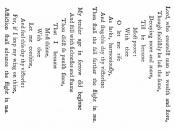Symbolic Bondage
"Trifles" is an extraordinary American drama. The title of this means "something of little importance or consequence." (Webster, 1374) It was written during the women's' movement for equality. The women in this selection are mocked numerous times by the men. Glaspell emphasizes through symbolic representation the life of a woman during her time, and what the movement represented. She states that a change must take place for women in order for them to obtain their personal freedom from the bondage of marriage.
The begging of this selection takes place in the Wrights' kitchen. There are two women; Mrs. Hale, the neighbor, Mrs. Peters, the sheriff's wife, and three men; Mr. Hale, the neighbor, Mr. Peters, the Sheriff, and Mr. Henderson the attorney. The men are there looking for evidence against Mrs. Wright for the murder of her husband. The women came along to help retrieve items that Mrs.
Wright has requested. The men go about their business, and treat the work that the women do as trifling.
County Attorney: Here's a nice mess.
Mrs. Peters: Oh, her fruit did freeze...
Sheriff: Well, can you beat the women! Held for murder and worrin' about her preserves.
County Attorney: Well, women are used to worrying over trifles. (1205)
The preserves took a great deal of labor. The men dismiss it as an every day occurance. All they know is that preserves magicly appear in a jar and they eat it. The men continue to show their apathy toward the duties of women. Even when the they are holding Mrs. Wright's quilt, which was evidence of her murdering her husband, the men ridicule the women.
Sheriff: They wonder if she was going to quilt it or just knot it! (laughing, the women look abashed)
Mrs. Hale: Mrs. Peters, look...


